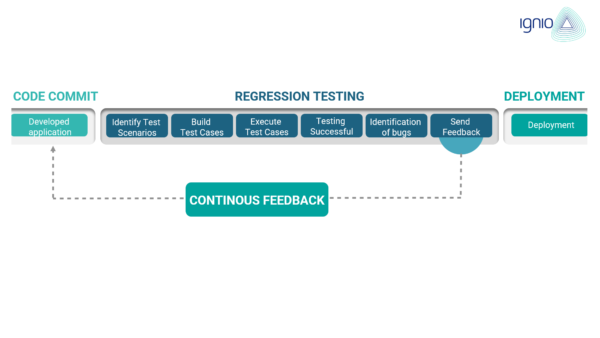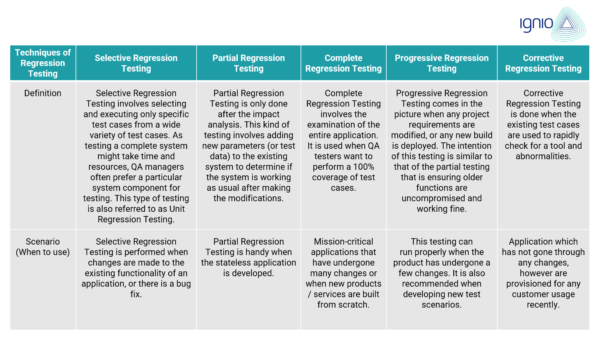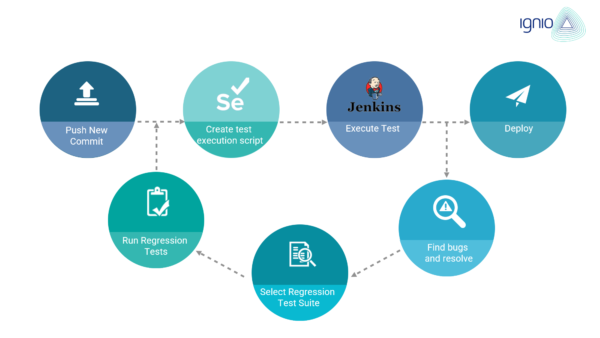With the advent of CI/CD process, changes are inevitable and continuous. Any changes made to the software applications can produce an unexpected outcome and can impact businesses at large.
Regression Testing is a type of Software Testing used to verify the changes made in an application that does not affect the existing functionality.
After the bugs are identified by engineers (software testers or developers), the developers modify source code to make it bug-free. If this process is completed every day, then it is often known as Continuous Testing. You can refer to the following diagram:
 Fig: Regression Testing in CI/CD process
Fig: Regression Testing in CI/CD process
Any software modifications could impact part of the source code and hence the functionalities.
Regression Testing is carried out to ensure that the changes made do not introduce any anomaly or cause components to fail. Here the test cases covering the modified and affected part of the code are selected and executed.
However, these test cases are selected and executed manually by QA testers, which can be time consuming and frustrating.
In this blog, we shall discuss the best way to automate the Regression Testing process in CI/CD.
Types of Regression Testing in CI/CD
There are five different techniques of Regression Testing based on the nature of changes made in the software or bugs repaired (or reversely the intention of the testing).
They are as follows:

Fig: Different Techniques of Regression Testing
How can we Automate Regression Testing for Software Tester?
CI/CD Architects often want to automate the software delivery process to ensure the software is delivered at speed. Testing is a function that is sought after by many architects for automation. Let us understand the stages of Regression Testing which a QA engineer would perform for Regression Testing and various tools available for its automation. Typically, there are three stages of Regression Testing:
Test-suite generation stage
Here a QA engineer would generate the test-suites (including the test cases and script) based on the code changes made in the application and the time in hand for testing. It can range from hours to days based on the complexity of changes in the applications.
Tools to automate Regression Test generation: Selenium, Appium, and Cucumber help in generating automated test-suites.
Test-suite execution stage
After these test-suites are generated, QA engineers or software testers can perform Regression Testing by executing the test case based on their requirements. The test-suite execution can be scheduled or made to run as per the requirement, easily using an automation platform. Continuous integration tools are often handy as they usually demand very little interference from software testers, to find the impact of the new applications, and to identify bugs.
Tools to automate test-suite execution: Jenkins
Test-suite maintenance stage
After the developers make the changes to the source code, Regression Tests also need to be changed. Maintaining the test cases becomes a highly complex process that requires substantial human effort when done manually. Many tools provide self-healing for automated tests generated, thus helping the tests to dynamically adapt to the changes.
Tools to maintain test-suite execution: Helenium

Fig: Regression Testing Automation
Challenges with automating Regression Testing
There are particular challenges in architecting Regression Testing automation in a CI/CD process using incumbent tools.
- Automation of all the three stages of Regression Testing that is test suite generation, test suite execution and test maintenance, can prove to be a big hassle. It includes taking 2-3 tools and involving testers to write scripts to maintain and integrate the tools for automation.
- Tools may execute, however, QA engineers still must spend time identifying test cases based on the impact. In the CI/CD process, when many changes are happening every day and are planned to be deployed fast, selecting the right test cases to minimize failure is time-consuming.
- Maintaining the test cases while adapting to the changes is the biggest challenge in today’s software testing world. Huge test case repositories are created, which are still maintained by QA engineers manually.
The best part is that all these challenges can be overcome by applying AI to Regression Testing. We have come up with ignio AI.Assurance – an autonomous assurance product that enables enterprises to deliver better software faster without any hassle. ignio AI.Assurance can find the business impact of any code change, formulate test-suites automatically, and provide the flexibility of choosing a testing strategy, executing it, and getting success / failure reports in the dashboard.
The QA engineers of Fortune 500 companies trust us to automate all the stages of Regression Testing so that they can focus on other strategic tasks associated with DevOps which they were unable to do earlier, due to the frustrating testing approaches. Now, they can spend more time with their families, eating pizza and getting a good night’s sleep.
Click here to know more.